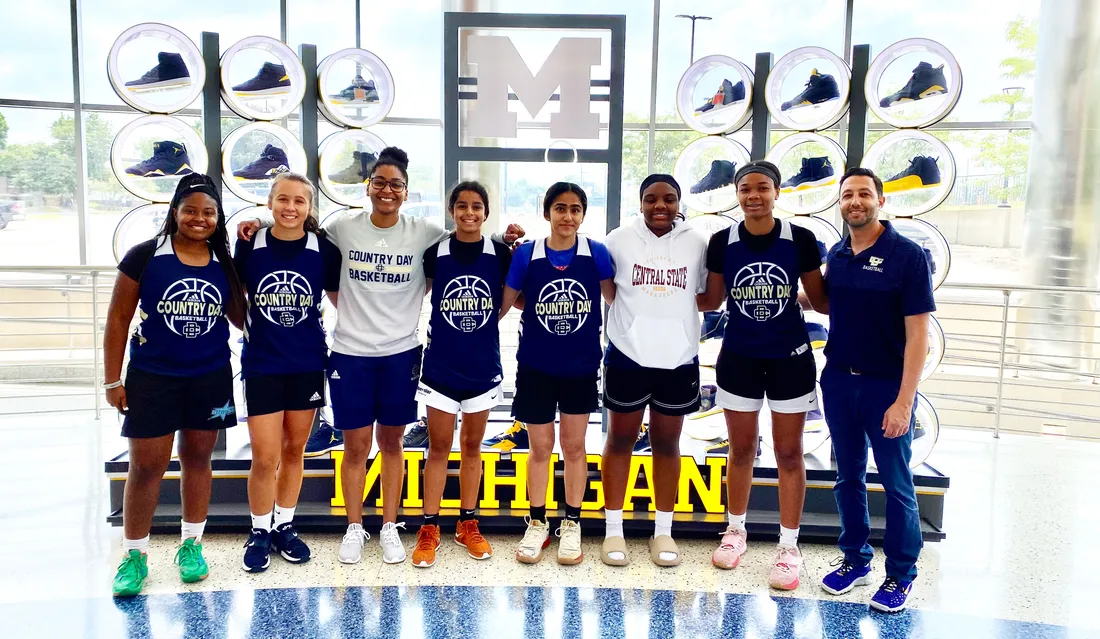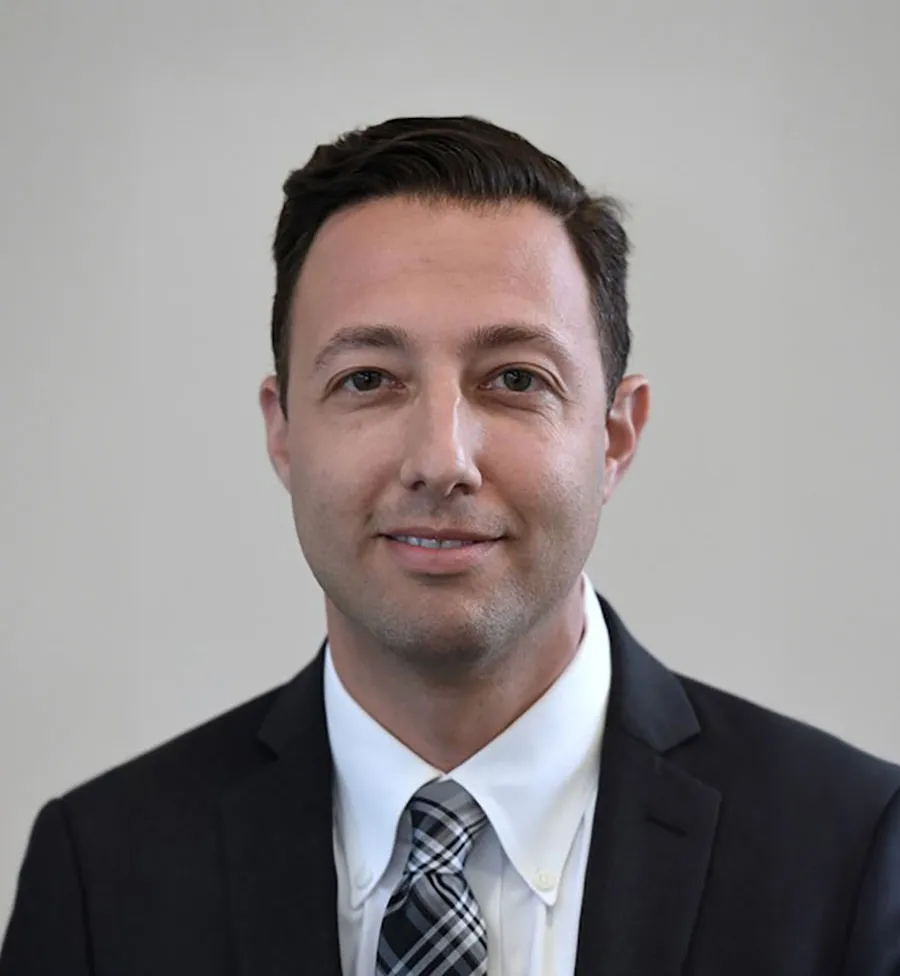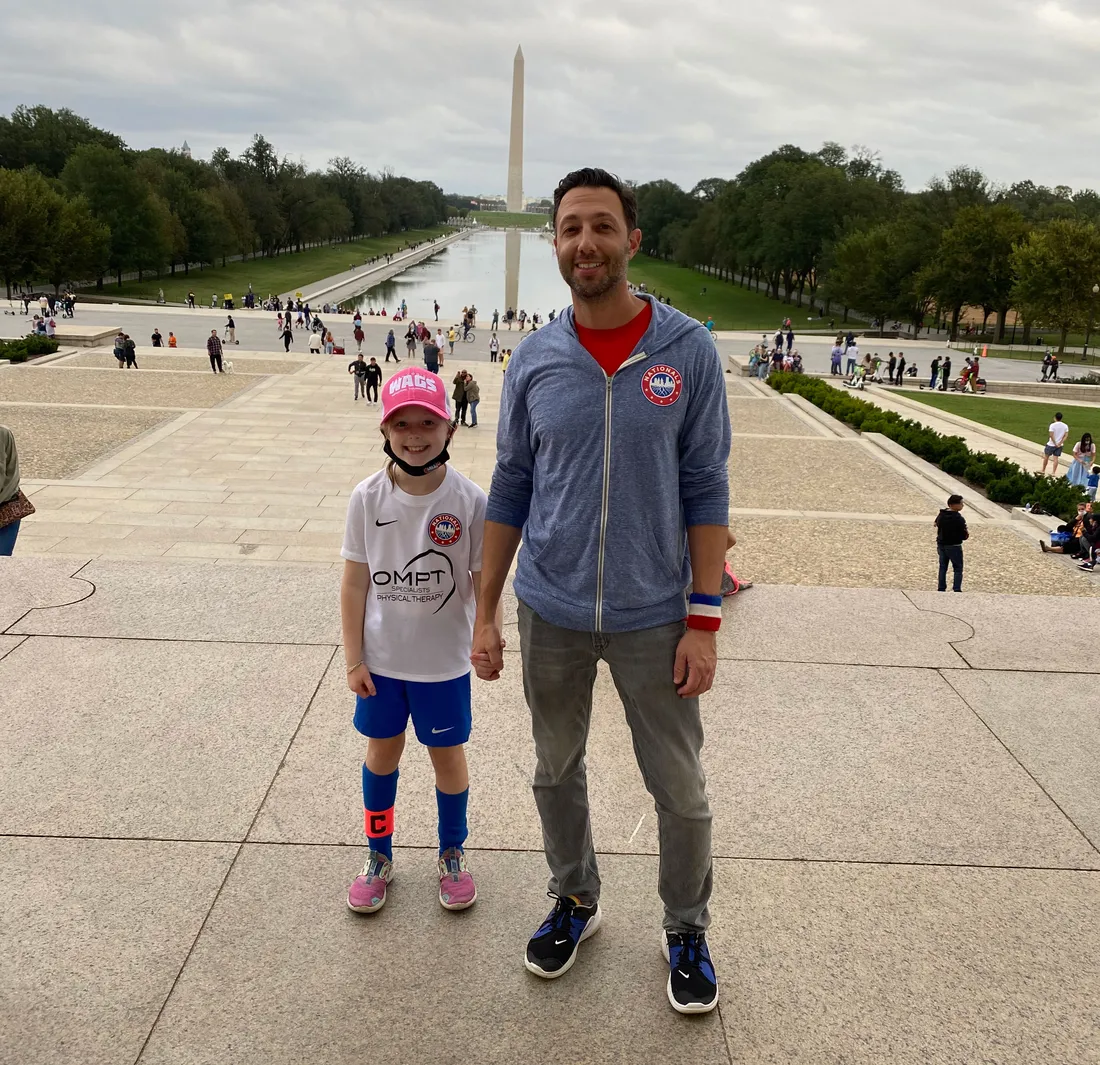
Scott Tainsky (far right), shown here with Detroit Country Day School players and coaches at a University of Michigan summer team camp, is the new Senior Associate Dean of Faculty Affairs and Academic Operations for the David B. Falk College of Sport.
Scott Tainsky’s earliest memories involve playing sports and watching the golden age of Big East Conference basketball with stars like Patrick Ewing, Chris Mullin, and Pearl Washington.
Now, as a father of two children who play youth sports, Tainsky says the “anchor events” in their household revolve around his children’s games and practices, and the sports they watch together on TV.
Tainsky has built his research career around the idea that sports bring people together, and that’s the focus and sensibility he’s bringing to the David B. Falk College of Sport as its new Senior Associate Dean of Faculty Affairs and Academic Operations.
“It’s the same feeling I hope to experience very shortly at the (JMA Wireless) Dome,” Tainsky says. “Being able to come together and root, root, root for the home team with the family was a salient experience for me as I grew up and became an athlete. Then, as a soon-retired athlete, it evolved from me competing to being one of the people either coaching or analyzing what’s going on for others to do their best to compete at the highest level.”
Tainsky, who started at Falk College July 1, was previously a professor of management and Director of Sport & Entertainment Management at Wayne State University in Detroit, where he was awarded Mike Ilitch School of Business awards for innovative teaching and excellence in research. He’s currently editor in chief of the Journal of Sport Management, the official research journal of the North American Society for Sport Management (NASSM), and he has co-authored over 50 journal articles, becoming a NASSM Research Fellow in 2015.
At the core of Tainsky’s research are the decisions made by high-level sports managers and how they impact both organizational performance and the collective well-being of fans.

Scott Tainsky
“Scott’s research interests–economics of sports leagues and teams, player performance analytics, and corporate social responsibility in national and international sports leagues–align perfectly with our vision for creating the nation’s premier College of Sport,” says Falk College Dean Jeremy Jordan. With programs in esports, exercise science, nutrition, sport analytics, and sport management, the Falk College of Sport launched July 1 as the first standalone college on a high-research activity campus (R1) to focus on sport through a holistic academic lens.
We recently connected with Tainsky to learn more about his research and how it will impact the College of Sport. Here’s that conversation:
Q: How did you develop an interest in studying the impact of sport?
A: My curiosity about the world and trying to incorporate that into my daily life. Being able to better the community that I’m a part of is ingrained by the fact that I grew up in a house where my father (Dr. Michael Tainsky) was a researcher--in his case he was trying to cure cancer and improve people’s lives that way.
Mine was much more social. As a social scientist, I have noticed the way sport can be such a valuable part of people’s lives. So my motivation was to create the best experiences and bring those experiences to the absolute most people possible. My first memory was watching Big East basketball, and I liked math. I try to bring those two worlds together to create the best social experiences for the greatest number of people possible.
Q: One of the College of Sport’s areas of excellence is community sport and wellness, or as Dean Jordan also calls it, “sport for good.” How does your research fit with the uplifting power of sport?
A: I’ve known Jeremy for a long time, and he’s appreciated in that vein by many people, so I have a lot of trust in everything we’re doing and where we’re headed. The intellectual side of that is no one has to do sport; it’s an elective part of our lives. Since so many are choosing to spend so much of our attention on this leisure activity, it’s an incredible opportunity to see what people truly value. At the same time, we can provide leadership in utilizing that to help create the most good in the community.
We’re here to help round out that part of their choice, to provide the right amount of sport, marketed and delivered in a way that’s consumable and made more efficient, where the product is better, and where the athletes are more informed.

Scott Tainsky with his daughter, Shana, on the steps of the Lincoln Memorial in Washington, D.C., after Shana, as team captain, led her club soccer team to the championship of the top flight of the 2021 Women and Girls in Soccer (WAGS) tournament.
Q: Is there a specific theme throughout your research?
A: If there’s a theme to my research, it’s this idea of positive externalities, and that’s a very technical term of what is being produced can produce additional good captured by others. So, for example, in the latest work that I did with (Falk College Sport Analytics Professor) Adrian Simion, we look at how the hotel industry is impacted by college football games. In this case, it’s not like Marriot or Hilton does anything different to be able to raise their rates or increase their occupancy rates on home football games. It happens because there’s so much excitement around sport; so much interest in being a part of that experience. So, in that case, we’re looking to quantify the externalities produced by football games.
There are other ways this presents in terms of viewership. When I follow Syracuse basketball and Syracuse basketball is having a good year, you would think that because we only have so much leisure time and I’m watching more of the Orange, it might take away the amount I choose to watch other basketball teams. But in fact, the opposite is true. As I become more deeply connected to Syracuse basketball, I’m actually more interested in some of the rival teams we’re competing against. So, we’re looking for those externalities, quantifying those externalities, and then helping round out the experience with the understanding that those things that may be counterintuitive are in play. How do we capitalize on this knowledge to produce the most good?
Q: As you get started here, what are your impressions of the Falk College of Sport and what it can become?
A: This is a unique project in that Falk College and Syracuse University have recognized that there are four legs of the stool, and you can’t get any balance unless all four of them are functioning and working together. You can’t create athletes and have competition at the highest level without understanding the exercise science portion and the nutrition portion of sport. And you can’t produce teams and individuals functioning at their highest level without sport management and sport analytics. And you can’t appreciate the whole of it unless all of those pieces are talking with one another . . . and there is literally not one other place that’s doing what’s happening right now at Falk College. It’s 100 percent the reason I wanted to be a part of this project and it’s not a new interest, it’s an interest there was no outlet for until July 1.
What drew me to Falk College in the first place was this vision of what can be if we bring together these disciplines that are often times separated and siloed. What I’ve discovered really quickly is there are a lot of good people, faculty, staff, students, alumni, and partners in the industry who feel the same and that’s what made my decision concrete. It’s such a welcome idea that I expect us to be doing incredible things quickly because of all the support I’m seeing and all of the buy-in for what we’re doing from so many different, important pieces of this puzzle.
Visit the Falk College of Sport website to learn more about academic programs and experiential learning in Falk College and career opportunities in the sport industry.
